|
|
|
Sort Order |
|
|
|
Items / Page
|
|
|
|
|
|
|
| Srl | Item |
| 1 |
ID:
153343
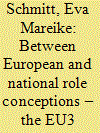

|
|
|
|
|
| Summary/Abstract |
This paper addresses whether Germany, France and the UK (the EU3) – with the EU in the background – can shape their own approach to a common Europeanised position or even a European role conception regarding the Iranian Nuclear Programme. As the EU3 initiative appears situated between Europeanisation and national role conceptions, it seems that the EU3 members – after a coherent start – were finally inclined to readapt themselves to certain of their national role conceptions, resulting in a “mix” of national and European role patterns in the process leading up to 2016. Currently, this mix hints at still-prevailing hindrances involved in genuine European conflict management, although this outcome holds the promise of greater European coherence in the future.
|
|
|
|
|
|
|
|
|
|
|
|
|
|
|
|
| 2 |
ID:
127253
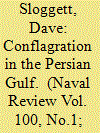

|
|
|
| 3 |
ID:
107157
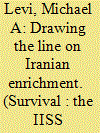

|
|
|
|
|
| Publication |
2011.
|
| Summary/Abstract |
How much Iranian nuclear capability is too much? The simplest answer is that any amount is unacceptable. By learning how to enrich uranium, Iran has given itself the potential to eventually produce enough weapons-grade material for one or more atomic bombs. That risk can only be removed if all Iranian enrichment programmes are eliminated. This belief has long been a mainstay of US rhetoric, if not policy, towards Iran.
But it is far from clear that zero enrichment is a realistic goal. Indeed, despite recent setbacks, Iran's leaders appear determined to continue improving and expanding Iran's enrichment programme; they may even have already decided to eventually build a bomb. The important question, then, is how much Iranian nuclear capability is too much, given the limited (and often costly) options available for curbing Iran.
|
|
|
|
|
|
|
|
|
|
|
|
|
|
|
|
| 4 |
ID:
122008


|
|
|
|
|
| Publication |
2013.
|
| Summary/Abstract |
In the abundant recent analysis of a nuclearising Iran, scholars and other experts have identified several dangers. The Iranian regime could bully regional rivals, increase its influence in Iraq, further challenge US power in the Gulf and set off a proliferation cascade. Another oft-cited danger is that, protected from retaliation by its nuclear shield, Iran will step up its support for proxy groups in the Middle East. Even without increased backing from Tehran, Hizbullah and Hamas may be emboldened to increase their attacks on Israel, believing that they are covered by an Iranian 'nuclear umbrella'. With a few exceptions, however, most recent analysis fails to explain how Iran would use the bomb to bring about such changes. As outlined by Paul R. Pillar, professor at Georgetown University, most commentary 'links Iran with sundry forms of objectionable behaviour, either real or hypothetical, without explaining what difference the possession of a nuclear weapon would make'. To understand the threats posed by a nuclear-armed Iran, therefore, and to devise policies to avert or mitigate these dangers, we must analyse the causal link between nuclearisation and its potential consequences.
|
|
|
|
|
|
|
|
|
|
|
|
|
|
|
|
| 5 |
ID:
127854
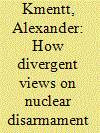

|
|
|
|
|
| Publication |
2013.
|
| Summary/Abstract |
The nuclear Nonproliferation Treaty (NPT) is facing several serious challenges. There are increasing doubts about its effectiveness in preventing the proliferation of nuclear weapons. The actions of North Korea are deeply worrying and significantly undermine the NPT edifice. The complex issue of the Iranian nuclear program and if and how it can be resolved will have serious repercussions for the treaty.
Universality is a key ingredient of the NPT's credibility, but looks more and more distant. Without India, Israel, and Pakistan, which never were parties, and North Korea, which declared its withdrawal from the treaty in 2003, the NPT's value as a security and confidence-building instrument is increasingly put into question in the regional contexts of the Middle East and Asia. Arguably its most serious challenge, however, is the extent to which it can still be considered as a framework in which to achieve nuclear disarmament. Fundamentally different and even conflicting views are apparent among the NPT membership on key aspects, such as the priority of nuclear disarmament, the demands of Article VI,[1] the definition of credible progress, and the way forward. These differences threaten the integrity of the NPT.
|
|
|
|
|
|
|
|
|
|
|
|
|
|
|
|
| 6 |
ID:
109753
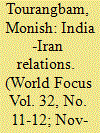

|
|
|
| 7 |
ID:
133523
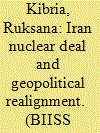

|
|
|
|
|
| Publication |
2014.
|
| Summary/Abstract |
The November 2013 interim nuclear deal that was signed between the P5+1 and Iran is an epochal event, though, given the volatile situation, it may be too early to make a correct prognosis of its ramifications. For one thing, the nuclear deal could complicate the regional security environment by exacerbating Saudi-Iranian tension, though as such, it is not the source. Regardless of Saudi displeasure at the conclusion of the accord, Iran's ascendancy is amply clear, with its ambiguous nuclear status playing a strategic role. While the dominant narrative currently is the centrality of Shia-Sunni regional tension represented by Iran and Saudi Arabia, reality is far more intricate and multi-dimensional, requiring a more nuanced appreciation of their relationship, which suggests that, for the foreseeable future it would be in the US interest to have Saudi Arabia, off-setting Iran, but from a much weaker position, in a replay of the game of balance of power achieved through sustained geopolitical manipulation, and a smaller American foot-print. The goal of Tehran's nuclear brinksmanship is essentially ensuring its regional primacy, which accords with US interests, too. While the recent interim Iran deal apparently concerns the nuclear issue, it has far-reaching implications for the global energy market, which the relaxation of economic sanctions and the integration of Iran as a legitimate member of the international community is certain to affect. US-Iran normalisation of relations is quietly enhancing China's role, both economic and military, in the Gulf region, whose energy resources for the foreseeable future would continue to remain crucial for Beijing. More than a reconciliation between Washington and Tehran, the essence of a real paradigm shift would involve a Saudi-Iranian accommodation, and de facto Saudi acceptance of Iran's regional pre-eminence.
|
|
|
|
|
|
|
|
|
|
|
|
|
|
|
|
| 8 |
ID:
118718


|
|
|
| 9 |
ID:
183790
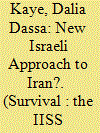

|
|
|
|
|
| Summary/Abstract |
Israeli Prime Minister Naftali Bennett’s cordial relations with the Biden administration and relatively muted posture during nuclear negotiations in Vienna raise questions about whether his government is pursuing a different strategy towards Iran than did his predecessor, Benjamin Netanyahu. This article argues that it is not. Despite reinvigorated Israeli debates critical of Netanyahu’s policies and improved atmospherics with the American government, official Israeli policy remains essentially unchanged. The Israeli government is still wary of nuclear diplomacy, offers few alternatives to continued diplomatic and economic pressure, and views military options as viable even if they can only set back Iran’s nuclear programme temporarily. While Bennett wants to avoid open confrontation with Washington, Israel will not relax tensions with Iran, particularly in non-nuclear arenas like Syria. In the past, Israeli sabotage against Iran’s nuclear assets subsided in the run-up to and after the nuclear agreement; this time around, Israel may not feel so constrained.
|
|
|
|
|
|
|
|
|
|
|
|
|
|
|
|
| 10 |
ID:
123236


|
|
|
| 11 |
ID:
151392


|
|
|
|
|
| Summary/Abstract |
This article analyses the US–EU transatlantic dialogue on the Iranian nuclear dossier with a particular view to the implications for EU foreign policy on Iran. Doing so, it uses neo-Gramscian scholarship to put the EU’s “over-compliance” with Iran sanctions into perspective. Constrained by the imperatives of hegemonic coercion in the form of US financial Iran sanctions against third country entities and with the hegemonic consent of a Western US-led “historic bloc”, Europe was relegated to a subaltern below its mediatory potential. It will be shown how this finding complicates the EU’s ambition to renew relations with Iran. Drawing on semi-structured interviews with experts and delegation members from the P5+1, this article thus analyses “the normative element” in the transatlantic security dialogue on Iran at a time where the latter is undergoing a sea change in the wake of the implementation of the “Joint Comprehensive Plan of Action” of July 2015.
|
|
|
|
|
|
|
|
|
|
|
|
|
|
|
|
|
|
|
|
|